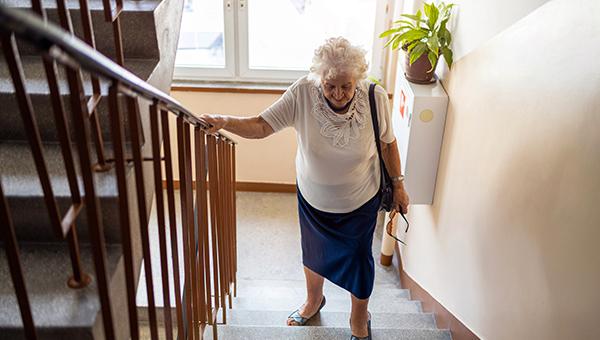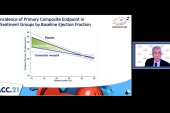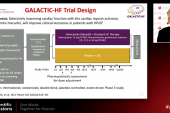METEORIC-HF: Omecamtiv Mecarbil Doesn’t Boost Exercise Capacity in HFrEF
“I would not call . . . this trial disappointing,” Maya Guglin says, pointing to the new information gleaned about myosin activation.

WASHINGTON, DC—Omecamtiv mecarbil (Cytokinetics), a novel selective cardiac myosin activator, does not improve various measures of exercise capacity in patients with heart failure and reduced ejection fraction (HFrEF) who are already well treated with existing HF therapies, the METEORIC-HF trial shows.
Treatment for 20 weeks did not improve peak oxygen consumption, total workload during exercise, ventilatory efficiency, or the amount of daily physical activity compared with placebo, according to G. Michael Felker, MD (Duke Clinical Research Institute, Durham, NC).

There were no safety signals related to peak exercise, which is consistent with prior studies of omecamtiv mecarbil, he reported recently at the American College of Cardiology (ACC) 2022 Scientific Session.
“Identifying medical therapies that can safely improve exercise capacity, one of the cardinal symptoms of heart failure, in our patients with heart failure and reduced ejection fraction remains an unmet challenge,” said Felker.
METEORIC-HF
Exercise intolerance is a hallmark of heart failure, and it’s not addressed by current therapies, even those shown to reduce cardiovascular events, Felker noted. Omecamtiv mecarbil has been shown to boost cardiac performance and to modestly improve hard clinical outcomes in the GALACTIC-HF trial, with greater impact among patients with the lowest ejection fractions.
To test whether the agent could improve exercise capacity as well, investigators designed the METEORIC-HF trial, conducted at 64 sites across nine countries, randomizing 276 patients (mean age 64; 15% women) 2:1 to omecamtiv mecarbil titrated by drug concentration or placebo for 20 weeks. All participants had chronic HFrEF, NYHA class II/III symptoms (79% class II), elevated NT-proBNP, and an LVEF no higher than 35% (median 27%). The trial included only those with an adequate exercise effort on screening cardiopulmonary exercise testing (CPET).
Background HF therapy was “outstanding,” Felker said, with a beta-blocker used in 96% of patients, mineralocorticoid receptor antagonist in 72%, ACE inhibitor/ARB/angiotensin receptor-neprilysin inhibitor (ARNI) in 95% (including ARNI in 66%), and a sodium-glucose cotransporter 2 (SGLT2) inhibitor in 18%.
The primary endpoint was the change in peak oxygen consumption (VO2) from baseline to 20 weeks on CPET. At baseline, peak VO2 was 14.7 mL/min/kg in the omecamtiv mecarbil group and 14.9 mL/min/kg in the placebo group. There was very little change in either arm over the treatment period, and the between-group difference at 20 weeks favored placebo but was not significant (P = 0.13).
The results were generally consistent across subgroups, with a suggestion of even worse outcomes for omecamtiv mecarbil among patients with persistent atrial fibrillation.
Several secondary endpoints did not show a beneficial effect of omecamtiv mecarbil, and in fact, the change in total workload during exercise significantly favored placebo (P = 0.025). That was driven, however, by a single outlier who performed suboptimal exercise at week 20, Felker said.
No between-group differences in safety events emerged, with a 67% rate of overall adverse events and 16% rate of serious adverse events.
Trial Provides Useful Information
Commenting on the results at a press briefing, Maya Guglin, MD, PhD (Indiana University School of Medicine, Indianapolis), chair of the ACC’s heart failure and transplantation council, said, “I would not call the outcome of this trial disappointing,” noting the results are important because they provide information on a new class of HF medications—myosin activators.
In the GALACTIC-HF trial—which was “mildly positive,” Guglin said—the sickest patients derived the most benefit. Perhaps omecamtiv mecarbil should be tested again in the most severely impaired patients with class III/IV symptoms and very low EF, she suggested.
“Consider it as a new class of inotrope, if you will, to increase myocardial performance in low-output patients,” she said.
And despite the neutral result of METEORIC-HF, the trial provides useful information by showing that omecamtiv mecarbil doesn’t provide a rapid improvement in exercise performance, but it is safe even when used during exercise, according to Guglin.
“I think it is overall an important trial which clearly adds to the wealth of knowledge we already have about myosin activators, and we should take this information and not push further [in] this direction, but focus more on other directions where these medications can provide real clinical benefit,” Guglin said.
Todd Neale is the Associate News Editor for TCTMD and a Senior Medical Journalist. He got his start in journalism at …
Read Full BioSources
Felker GM. The effect of omecamtiv mecarbil on exercise capacity in chronic heart failure with reduced ejection fraction: the METEORIC-HF study. Presented at: ACC 2022. April 3, 2022. Washington, DC.
Disclosures
- METEORIC-HF was funded by Cytokinetics, Amgen, and Servier.
- Felker reports receiving grant support from the National Heart, Lung, and Blood Institute, the American Heart Association, Novartis, Merck, Bayer, Bristol Myers Squibb, Cytokinetics, and CSL Behring; consulting for Novartis, Amgen, Medtronic, Bristol Myers Squibb, Cytokinetics, Abbott, Cardionomic, American Regent, Reprieve, Boehringer Ingelheim, AstraZeneca, Sequana, Whiteswell, and Myovant; and serving on endpoint adjudication committees/data and safety monitoring boards for Amgen, Merck, Medtronic, EBR Systems, V-Wave, LivaNova, Rocket Pharma, and Siemens.
- Guglin reports no relevant conflicts of interest.




Comments